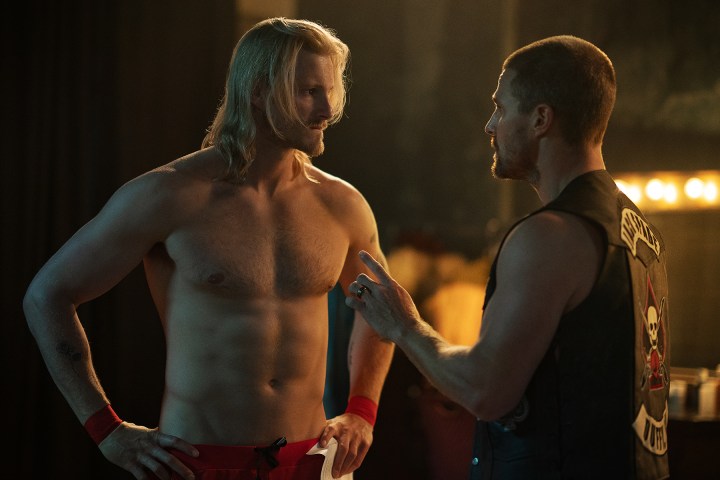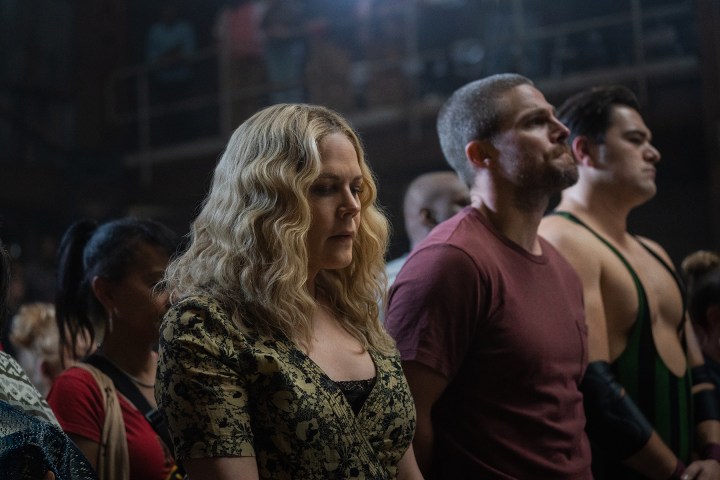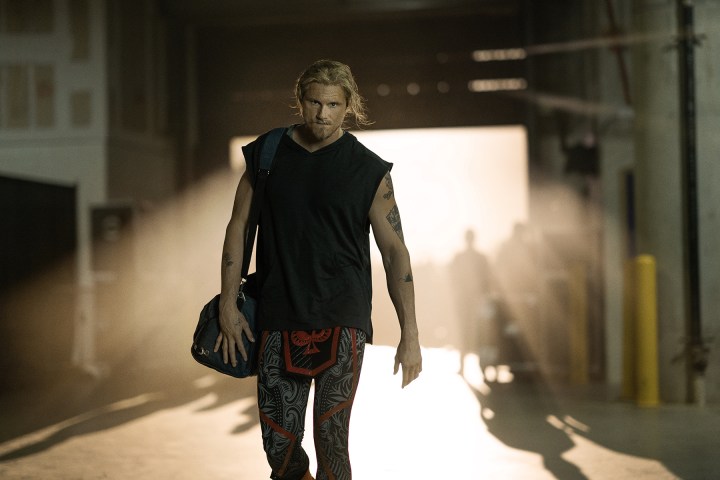Professional wrestling exhibits some of the most sophisticated storytelling in all of television. As a fan, it’s insulting to use the words “fake” when cynics describe pro wrestling. It’s the furthest thing from fake. Pro wrestling is scripted, just like any movie or television show. Pro wrestlers create characters to present to a live audience inside the ring. They work with writers to script promos to read in front of a crowd. Unlike most actors, pro wrestlers are exceptional athletes who do their own stunts inside the ring, implementing fight choreography to mimic a real brawl. It’s an art form that should be treated with respect and great care.
Heels, a drama television series about professional wrestling, is a love letter to pro wrestling that shines a light on the intricacies inside and outside the ring. Stephen Amell and Alexander Ludwig star as Jack Spade and Ace Spade, rspectively, two wrestlers vying for glory and attention via their late father’s Georgia wrestling promotion, Duffy Wrestling League (DWL). It’s been two years since the season 1 finale, but the critically acclaimed drama is returning for an eight-episode second season on STARZ.
Mary McCormack, who plays Jack’s business partner, Willie, compares Heels to Friday Night Lights. You don’t need to love football to appreciate Friday Night Lights. The same can be said with pro wrestling and Heels because, according to McCormack, “Good storytelling is good storytelling.”
In an interview with Digital Trends, Amell, Ludwig, and McCormack discuss Heels season 2, the respect they’ve gained for professional wrestlers, and why good storytelling conquers all.

Note: This interview was conducted in June 2023 before the SAG-AFTRA strike. It has been edited for length and clarity.
Digital Trends: In Willie’s relationship with Crystal, it’s interesting in that, as two of the only women involved in the promotion, you would think they would team up, but Willie is very hard on her. Why do you think that is?
Mary McCormack: I mean, I think she really likes her, and I think she’s hard on her because she wants her not to mess it up. [laughs] I think she has a lot invested in Crystal. I think, consciously and subconsciously, she is invested in Crystal because it’s her dream, too. It’s an itch that she’s carried all these years getting scratched.
I think she’s literally excited by it. Really excited by it, needs it, and also a little jealous of it. I think it’s a lot of things, but I think the harshness is usually her coaching, like saying, “Don’t get ahead of yourself. Don’t get too far out over your skis. Let’s not mess this up.” I think she needs it, too.
Almost like a tough love mentorship.
McCormack: Sure, like any good coach.
Willie and Jack’s relationship is another intriguing one. She’s the right-hand person to Jack. They’re technically partners, but Jack has the final say. How does Willie view Jack? Why does she continue to stay around?
McCormack: I think that is more about his dad. I think she loves Jack and respects him, but when she says he doesn’t have to know everything, he doesn’t. I think Willie knows where bodies are buried from her time with Tom. She doesn’t want to involve him in all that, even though they are in on most things together. I think it speaks more to her relationship with Tom.

I want to get into the process of scripting the matches in the show. Stephen, do you take into account if a move makes sense for a character or if a move will give a character heat? Do you treat this like a real wrestling promotion?
Stephen Amell: Yeah, scripting the matches is good. It’s very important that we set up everything that happens before the bell until the bell. The actual match in and of itself, we’ve got 48 to 50 minutes. Jack and Crystal, in the second episode, their match with Wild Bill should be like a 20- to 30-minute match. We can’t do that unless we sort of break and actually do a full wrestling match. We have to look at it as a lowercase “m” montage. We have to hit the important notes.
But that gets back to the psychology of it all. I think that everyone knows their character really well. You come into it with a general idea. [Showrunner] Mike O’Malley gets pretty specific when it comes to certain aspects of the wrestling match. For example, in the finale, there’s a move that Jack wants to attempt, and we were very specific about that move. Then, when it gets into the actual logistics of the actual wrestling match, we’ve got our guy, Luke Hawx, a pro wrestler himself, working on our stunt team.
We have Scott [Hunter], who plays The Dad, working on our stunt team. We have three excellent doubles … . It all becomes a collaborative process of, “Alright, let’s find some stuff that makes sense and, also, some stuff that … our directors can make look really cool.”
Now that you’re two seasons into the series, you’ve had a little taste of pro wrestling. What have you learned is the biggest misconception about professional wrestling?
McCormack: When people say it’s fake. Yes, it’s storytelling, and storytelling is a huge part of it. But the athleticism, the risks they take, and the things they pull off, are not fake. The training that goes in, the mad athleticism that’s involved, is not fake. That’s all really real and super impressive and scary. There’s a real price to pay for these guys.

Did you have an eye-opening moment, maybe while filming season 1 or season 2, where a light bulb went off, that this is more than meets the eye?
McCormack: Yeah, I don’t know if there’s a moment. I’m trying to think. It was just a general sort of learning because I didn’t know that much about the world. Diving in and watching interviews and looking at people’s lives and how many of them are injured and/or addicted. The rough road that the world often is. Not always, but often can be.
Just the research I was doing in general. I don’t know if there was a moment. Seeing our guys — we have CM Punk and AJ Mendez this season — and watching them go is incredible. But even watching our actors, after all the training they do to pull off some of these sequences, is incredible.
A lot of professional wrestling is storytelling, inside and outside the ring. Alexander, have you learned anything about storytelling in wrestling that you’ve been able to apply to other roles outside the show?
Alexander Ludwig: Well, I certainly learned a lot about wrestling in general. The one thing that always attracted me to this show, not only is it just about human beings and wrestling, but I love the idea of the live show aspect of it. When I used to work with Dwayne Johnson and then Edge (Adam Copeland), they both told me stories about what would happen when you were doing a live match and somebody started shooting*. It was like, “What do you do in that scenario?”
To me, that is so fascinating. It’s the only type of sport I can think of where the outcomes that were predetermined can be changed because one person doesn’t want it to end the way that they said they were going to. And I’m just like, just fucking . . . it’s like going to a Broadway show and then watching the lead of the musical just start getting his ass kicked. It’s like, “Holy shit.” Trying to go with the flow when things go completely awry was really fascinating. I think I’ve always had a version of that in my own life, like nothing’s going to go as planned, and you just have to take it as you can.
The truth is the only thing I’ve really learned from the show is just how much pain these people really take. [laughs] I have so much respect for these people. We’ve certainly pushed the boundaries as much as we can every season. And I’ve learned a great deal about what my own body can take and the kind of consistency and pain tolerance you have to have to be able to be an expert at the sport. I think these people are insane, and I also respect the shit out of them, so we just want to do right by them.
*In pro wrestling, shooting is an unplanned or unscripted occurrence during a match.

With fans that don’t have a relationship with pro wrestling, what has been the key to bringing in a different audience to watch a show like this?
McCormack: I mean, I’ve said it before, and I’ll say it again. For me, it’s like I didn’t care about football. I still don’t care about football, and I would watch another season of Friday Night Lights right now. Good storytelling is good storytelling. It doesn’t matter if you know anything about wrestling. Family dynamics are interesting. Flirting is interesting. It’s all interesting. People’s histories, the search for identity, and making dreams happen with no budget. All of that’s fun and fun to watch. Yeah, you don’t have to care about wrestling.



